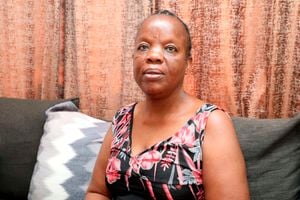
Women in Nairobi take part in a protest dubbed 'Feminist march against femicide' on January 27, 2024, to protest against the rising femicide across the country in recent months.
It’s a sad telling just how many women constantly live in fear of harassment, at work, on the streets, by stalkers, and in various places you could think of. But when the threat comes from your own home, your spouse, the trauma multiplies.
In the dimly lit alleys of Nairobi’s Mukuru Kwa Njenga, known ominously as ‘Moto Moto,’ the echoes of tragedy reverberate, each step a reminder of lives lost to femicide. Here, the air is thick with the silent screams of women whose dreams were violently shattered by those they once trusted.
Starlet Wahu, Rita Waeni — are names that echo through the collective consciousness of a nation grappling with the latest horror of femicide. Their stories, once brimming with hope, now serve as chilling reminders of the relentless brutality faced by women across Kenya.

Residents of Mombasa during the anti-femicide protest on January 27, 2024.
As we navigated through the shadowed streets of ‘Moto Moto’, the magnitude of the crisis became starkly evident.
Femicide is not just a statistic but a haunting narrative of shattered lives and stolen futures. We went out on a mission to seek voices of women who were brutally abused in their homes by their spouses, but by sheer luck, managed to escape the harrowing snares of death in the hands of their husbands.
* * *
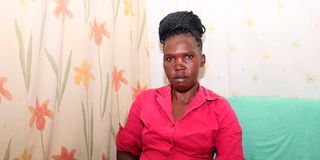
Linet Atyang during at her home in Mukuru kwa Njenga in Nairobi on February 6, 2024.
It was 1pm on February 6, and we are here to talk with Linet Atyang, 35, a mother of four.
"I stayed in an abusive marriage out of desperation," Ms Atyang opens up, with a faint chuckle in her voice just to hold the tears back.
After enduring years of relentless violence at the hands of her husband, she found herself trapped in a cycle of despair. Only through the kindness of a stranger and sheer determination did she break free, reclaiming her life and her dignity.
"I met my first boyfriend at age 16 . We were together for five years before we started living together in 2005, and it was then that I came to kow of his true colours. I got pregnant with our first child within one year of living together, and things were still okay in our home. The beating started when I was heavily pregnant with our second born,” she says.
She adds: “He started drinking. It got to a point I never used to ask him any question because every time I did, I would be beaten up. I got so many injuries, but I still stayed. My family members would encourage me to keep fighting for my marriage every time I ran back home, and so I listened to them and stayed. Beating me became his hobby.”
"One day I came to the realisation that this man was going to kill me, and at the time I had two daughters already. So I decided to go back to my parents’ house and ask my mother to take care of my children as I looked for a job. But she told me to return to my husband’s house. So I had no choice but to go back. I was beaten so badly for running away. He cut my leg with a knife, but I managed to run out, anyway.”
"When he cut my leg, he was not aiming for it, he was actually aiming for my head. He wanted to kill me. I managed to take my children and ran away to Bungoma. After some time, life became too difficult to bear, and so out of desperation, I found myself going back to him. When I got there, I found that he had re-married, but I knew I had nowhere else to go. My family had abandoned me because they believed that a woman’s responsibility is to her husband, so they kept pushing me away encouraging me to stay on despite the brutality," she says.
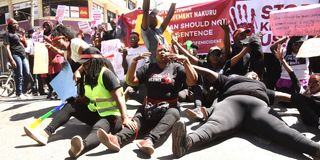
Women and human rights activists hold a peaceful protest along Kenyatta Avenue in Nakuru City against femicide in the country.
"So because I knew I had nowhere to run to, I decided to persevere. The same day I returned, the village elders sat him down to talk to him. During the meeting, he seemed remorseful, but this did not last. ‘You should have died,’ he told me.
"Just a few days after that, without any reason, he came and hit me with a panga. The following morning when I went to the shop to get some medication, I came back home and found him beating up my daughters.”
"I thought he would change, that’s why I stayed in that household, but he didn’t. It only got worse. I stayed there out of desperation.”
"In 2012, I met a certain woman who told me I needed to get my life together for the sake of my children. Whenshe learnt that I was being beaten every day by my husband, she asked me why I kept staying, and all I could tell her I was not financially stable to take care of the children by myself,” she narrates.
"Out of pity she offered me a casual job and told me to work and get some money to help me leave the abusive marriage.That was my turning point. I learned last year that he had died."
* * *
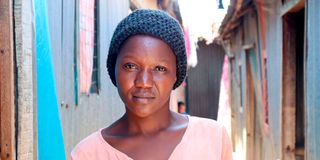
Irene Mumbua at her home in Mukuru kwa Njenga in Nairobi on February 6, 2024.
In the same neighbourhood, I meet another victim. Irene Mumbua, 31, says she found herself ensnared in a web of violence and manipulation, with her pleas for help falling on deaf ears. Even in death, her tormentor’s grip remained, a chilling reminder of the terror she endured.
"I would find my husband with different women, and whenever I confronted him, he threatened to kill me. He started beating me, and I decided to leave him and go back to my parent’s home with my children. After a while, he followed me and pleaded that we reunite but I didn’t want to. My mother then intervened and asked me to be patient with him and persevere.”
“After a while, he went to Mombasa and left me with the children without so much as food in the house. He stopped calling and he didn’t come back for a long time, so I had no choice but to go to my relative who lived close by. After five months, he came back but started being violent. I have scars on my body from the fights we had. Whenever I questioned him on why he was not providing, he would beat me. Whenever I caught him red-handed with another woman and questioned him, he would beat me up,” she narrates.
“ I hated my life. I tried running away several times but he would still track me down and bring me back to the house. One evening, as he was coming back home drunk, he fell into a ditch and hit his head badly. He got sick, and when he went to the hospital he was told he had internal bleeding. He died three days later," says Ms Mumbua.
* * *
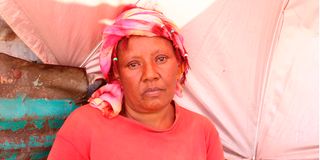
Grace Koki during an interview at her home in Mukuru kwa Njenga in Nairobi on February 6, 2024.
It was three hours to sunset by the time we were heading out to meet Grace Koki, 55.
"I have tried committing suicide before because of my marriage," she says with a heaviness in her voice.
"It got to a point where I felt like I didn’t deserve to live. We were okay for the first three years of our marriage, but after that, it was fight after fight. One day he came back home and locked me in a room where he had hidden a knife. I screamed and by luck, our neighbours heard me and came to my rescue. He wanted to kill me, but even after that, I couldn’t leave because I had nowhere else to go with my children,” she says.
“A few days after the incident, he went back to punching me, and this time he even threw a stone at me that my leg got injured permanently. At last, I decided to run away even though I had nowhere to go. A friend helped me get a place temporarily until I got a job that could sustain me and my children. I was later informed that my husband remarried and had other children with his current wife," Ms Koki says.
Ms Koki’s estranged husband initially told the Nation he could not recall who the mother of three was. "Unaniuliza kuhusu Grace mgani?"(Which Grace are you asking me about)," he said.
But after revealing her full name, he responded: "Yes, I know her, but we are no longer together".
When questioned about his alleged violent tendencies towards Ms Koki while they were together, he said that was all in the past.
"If we had any altercations back then they are long gone now," he said.
When questioned about the children, he said, "I am not stable enough to help the children. So the mother takes care of them the way she can on her own. I am living life separately from them. You can’t feed someone when you are hungry."
* * *

Nelly Malika during an interview at her home in Mukuru kwa Njenga in Nairobi on February 6, 2024.
As the day ended, we sat down with Nelly Malika, 35, a mother of two, who despite the threats and violence she endured, refused to be silenced, reclaiming her voice.
"He did not want to have female children, but I gave birth to two. My in-laws did not like it as well, and that made my husband angrier. I gave birth to both my children through CS (Caesarian Section), which according to my husband’s family, symbolised a bad omen. That’s where problems started. We stayed together for almost six years. At first, he wasn’t beating me but it all started with insults every night and he eventually stopped taking care of me and the children.”
"One day, he got paid and he gave me money to pay rent. So I decided that instead of paying rent, let me just take the money and go back to the village with my two children. So I went to the village and stayed there for two weeks, then I came back. When I came back, he didn’t say a word. After a few days, he came and told me, ‘Unajua siku moja nitakuja kukuua?’ (You know one day I will come to kill you?). That night we had an argument and he got a knife and cut me on part of my head. Aware of what he did, he started blaming satan. That was a red flag for me and I decided to call it quits. I have been living alone with my children since then. He went on to marry a woman who gave him two sons," says Ms Malika, who is no longer in contact with the man.

Women's rights activists and residents of Nyeri join a procession in Nyeri town to protest against the rise in femicide in the country. Feminists held a nationwide protest dubbed ‘Feminists March Against Femicide’ on Saturday, January 27, 2024.
* * *
Jane* (not her real name), who is in her 20s, sits thoughtfully in her iron sheet made house, her eyes fixed on her one-year-old baby boy.
The haunting question echoes in her mind – what if her husband’s torrent of abuse had prevailed? The mere contemplation sends a chill through her spine.
Also Read:#EndFemicideKE - Chants, screams as women in Nairobi protest against rising cases of femicide
Within the confines of this modest space, a wooden couch takes centre stage, bearing witness to the silent struggles etched into the walls of this divided sanctuary. A single room split into two.
On the left, a simple brown wooden bed, shielded by polythene paper, stands as a refuge tainted by the lingering echoes of pain. Clothes drape across the curtains, attempting to veil the harsh reality that separates the living room from the bedroom.
"The first instance involved him striking my head with a knife. The second attack he threw a saucepan filled with hot oil at me. He ran after me with a rock that was in the house. He chased me all over the neighborhood determined to kill me, but then I was saved by a friend who took me somewhere to hide for the night. My husband went back to our house that night and threw all my things out. But I still stay with him, there is nowhere to go," says Jane while touching her scar as tears flow.
Gently holding her leso, Jane delicately wipes away the traces of tears that bear the torment she endures. With a heavy heart, she proceeds to fold her clothes, each garment carrying the weight of a painful history. As she recounts the brutal aftermath of her return, the scars of oil burns and injuries linger on her battered body.
"I can’t tell you why he does it, but I know I have nowhere else to go, because financially I am not capable, especially with my three sons. I would want to go back to my village with my children if I get the chance. I am still trying to survive," she adds.
As the day dawned on me, the reality of the matter at hand became clearer. ‘We are far from the end’, I thought to myself.
The recent #EndFemicide movement served as a testament to the power of collective action, yet only the beginning of a long and arduous journey towards healing and transformation.
Data from Africa Data Hub paints a grim picture of a society grappling with its own demons. From 2016 to the present, over 500 cases of femicide have been reported, each one a tragic testament to the pervasive nature of Gender-Based Violence.
Out of the reported cases, only 15 percent were perpetrated by strangers to the victims. In the majority of cases, the murderer was a friend, relative, or intimate partner of the murdered woman.
The bulk of killings were committed by intimate partners and family members, with spouses and boyfriends being the most common offenders. The perpetrators, once questioned, justify their actions by saying that they were angered by the victims.

